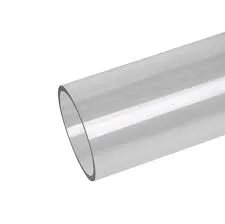Aug . 13, 2024 23:56 Back to list
Exploring the Benefits and Applications of PVC Connection Pipes in Modern Plumbing Systems
The Benefits and Applications of PVC Connection Pipes
Polyvinyl Chloride (PVC) connection pipes have become a staple in various industries due to their versatility, durability, and cost-effectiveness. Primarily used for plumbing and construction, PVC pipes are made from a synthetic plastic polymer that has a myriad of properties making it an ideal choice for fluid transportation, drainage, and structural applications. This article will explore the benefits and applications of PVC connection pipes in detail.
One of the primary advantages of PVC connection pipes is their resistance to corrosion. Unlike metal pipes, which can rust and degrade over time when exposed to moisture, PVC pipes maintain their integrity even in harsh environments. This property ensures a longer lifespan for installations, reducing maintenance costs and the need for frequent replacements. Additionally, PVC is not susceptible to chemical corrosion, making it suitable for transporting a wide range of liquids, including those that may be corrosive or acidic.
The Benefits and Applications of PVC Connection Pipes
The cost-effectiveness of PVC connection pipes is another compelling reason for their widespread use. Compared to traditional materials such as copper and steel, PVC pipes are generally less expensive to manufacture and purchase. The lower production costs translate to significant savings for contractors and homeowners alike. Furthermore, the longevity and low maintenance requirements of PVC reduce long-term expenses associated with plumbing and drainage systems.
pvc connection pipe

PVC connection pipes are also highly efficient when it comes to fluid dynamics. The smooth interior surface of PVC pipes allows for minimal friction loss, facilitating better flow rates compared to other materials. This quality is crucial in applications requiring efficient transportation of water or other liquids, as it can lead to significant energy savings in pumping systems.
In terms of applications, PVC connection pipes are widely used in residential plumbing systems for both potable water supply and wastewater drainage. In commercial settings, they are utilized in HVAC systems, irrigation, and industrial processes. The versatility of PVC pipes extends to outdoor applications as well, where they are often used in drainage systems, rainwater harvesting, and landscape irrigation.
Additionally, PVC connection pipes are gaining traction in the realm of modern construction as they can be easily integrated into building designs. They are used in venting systems, electrical conduits, and other infrastructure components, demonstrating their adaptability to various construction needs.
The environmental impact of PVC is also worth mentioning. While the production of PVC involves some environmental concerns, advancements in manufacturing processes have led to more sustainable practices. Moreover, PVC is 100% recyclable, and its long service life reduces the frequency of material use and waste generation over time. As more industries adopt circular economy principles, PVC's recyclability makes it an increasingly attractive option.
In conclusion, PVC connection pipes offer an array of benefits, including corrosion resistance, lightweight design, cost-effectiveness, and efficient fluid dynamics. Their applications span across residential, commercial, industrial, and environmental sectors, making them a versatile choice for various plumbing and construction needs. As industries continue to evolve, the adoption of PVC connection pipes is likely to increase, paving the way for more innovative and sustainable practices in fluid transportation and beyond.
-
HDPE Steel Belt Reinforced Spiral Corrugated Pipe | High Strength
NewsAug.17,2025
-
HDPE Pipe Fittings: Durable, Leak-Proof Solutions
NewsAug.16,2025
-
Premium CPVC Sheet: High-Temp & Chemical Resistant Solutions
NewsAug.15,2025
-
Durable PPR Pipe for Hot & Cold Water Systems - Easy Install
NewsAug.14,2025
-
Durable HDPE Sheet | Versatile & Impact-Resistant Plastic
NewsAug.13,2025
-
Premium PVC Soft Sheets: Clear, Flexible & Durable
NewsAug.12,2025

